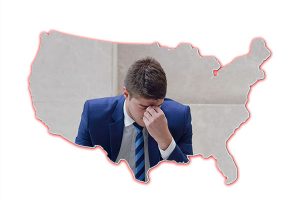 We have a mobile society, and after separation or divorce, it is not uncommon for one of the spouses to move out of state. If either of them later decides to file for divorce or to request a modification in a divorce, then residing in two different states—or even different countries—makes it a little more complicated.
We have a mobile society, and after separation or divorce, it is not uncommon for one of the spouses to move out of state. If either of them later decides to file for divorce or to request a modification in a divorce, then residing in two different states—or even different countries—makes it a little more complicated.
The first step is deciding where to file. It is imperative to file in a state that will have jurisdiction over your case. The most important factor is residency.
What if you want to serve divorce papers or file a request for modification of a divorce in New Jersey, but your spouse does not live in the state?
Every state has different residency requirements. If you want to file in New Jersey, you must meet one of the following requirements:
- You have lived in New Jersey for the twelve months prior to filing for the divorce
or modification.
- You paid income tax in New Jersey for the twelve months prior to filing for the
divorce or modification.
- Your principal home is in New Jersey, but you are temporarily living elsewhere
because you are serving in the military.
- Your principal home is in New Jersey, but you are temporarily living elsewhere
because of your employment.
If you and your spouse meet the residency requirements of two different states and each files separately in a different state, it is likely that the courts will decide to hear the case of the spouse who first provided notification to the other that he or she is filing. Therefore, it is in your best interests to contact a qualified attorney as soon as possible.
Because every state has different laws governing child support, alimony, property distribution, and other issues that are involved in divorce cases, where you file can have a great impact upon your future lifestyle.
Child custody is generally governed by the state in which the child resides. This is due in great part because of two laws that have been adopted by almost every state: the Uniform Child Custody and Enforcement Act and the Parental Kidnapping Prevention Act.
The Uniform Child Custody and Enforcement Act (UCCJEA)
and the Parental Kidnapping Prevention Act (PKPA)
In determining jurisdiction, the UCCJEA gives priority to the child’s home state.
- The UCCJEA defines “home state” as “the State in which a child lived with a parent
or a person acting as a parent for at least six consecutive months immediately
before the commencement of a child-custody proceeding.” If the child is less
than 6 months of age, then the time period requirement is adjusted.
- The UCCJEA provides that any state that is not the “home state” of the child
will defer to the “home state,” if there is one, in taking jurisdiction over a
child-custody dispute.
- The UCCJEA provides that once a state has established jurisdiction over a child-
custody case, the order of that state is protected from modification in any other
state as long as the original state retains jurisdiction over the case.
- The PKPA provides that once a state has exercised jurisdiction, that state will
continue to have exclusive jurisdiction until no party to the dispute still resides in
that state.
There are emergency provisions, however. If there is evidence of abandonment, abuse, or mistreatment of the child, another state can take jurisdiction under the UCCJEA.
What if you have been served with divorce papers or a request for modification from New Jersey but you do not live in the state?
If you live in another state—or even in another country—and it is inconvenient for you to travel to New Jersey to appear in court, you might feel overwhelmed. How will you be able to handle the various issues that must be addressed? How will you be able to attend the necessary hearings when you live far away?
A qualified New Jersey divorce lawyer can handle all the issues involved in your divorce or modification request. Modern technology makes it possible to communicate effectively without actually being together. Cases vary, but the judge in your case may even allow your New Jersey attorney to act as your representative without your having to appear in Court if it can be shown that a personal appearance would be difficult.
Whether you or your spouse is the one who lives out of state, residing in two different states or countries brings an additional source of anxiety to the situation. The advice and assistance of an experienced New Jersey divorce and family law attorney can guide you step by step and help you get through it with as little stress as possible.
The material provided at this website is intended for general informational purposes only. It should not be regarded as legal advice. Consult an attorney for legal advice concerning your particular situation. You are welcome to call Aretsky Law Group, P.C., 24/7 at 201-580-3411 to set up
 New Jersey Lawyer Blog
New Jersey Lawyer Blog

